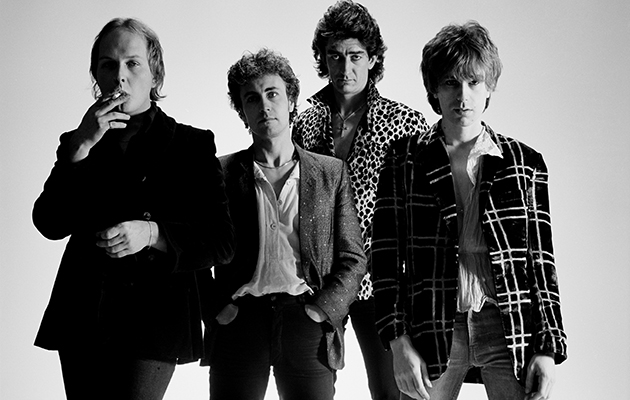PERRETT: There was a bit of reluctance by one member to play at the speed that I started playing it – I won’t say who, because it’s not fair on them. It is the most perfect arrangement that the band ever got for a song, though.
PERRY: In the studio was where it emerged as such a powerful piece.
PERRETT: We had three days demoing at Escape Studios [in Kent] – two days getting fucked up and one day of actually recording. We recorded “Another Planet…”, “Oh No”, “The Whole Of The Law” and “Special View”.
PERRY: By the time we recorded “Another Girl…” I knew the shape, the form of the guitar solo and the intro, if not the actual phrases. I knew it would start low and work upwards, but I hadn’t settled on completed phrases. The guitar was all one take, the first take. I thought I was doing a run-through to get levels, so after one pass I went into the control room to see if we were ready to try a few, and everyone was jumping around saying, “No, no, that’s the one! You’ve got it!”
PERRETT: Most of the debut album was recorded at Basing Street Studios after that. Apart from after we signed to CBS, when they asked us to try out Whitfield Street, which was CBS’s studio. But we didn’t like the studio for some reason. What I remember most about that is Sandy Denny coming to the session and saying that if I ever wanted any backup vocals, she’d love to sing. I didn’t take her up on that, which I really regret, ’cos I was a big of Fairport Convention fan until the third album. But I was very full of myself back then and I didn’t think that I was a fan of anyone anymore.
MAIR: The atmosphere was fantastic at Basing Street. Bob Marley & The Wailers were in the studio below us, recording Kaya. We kept on trying to record “Another Girl…” again. But it wasn’t really working. Eventually we played the original 16-track Escape demo and everything we needed was there. So we decided we would just transfer the 16 tracks into the 24-track, but the machine at Escape was out of alignment, so it was all muffled. The roadies first of all thought to bring the machine up to Basing Street, but the engineer, John Burns, said, “No, we’re not moving the machine in the back of a van.” He said we should bring the tape in and he’d put a tone on it. So we matched the heads up and then played it at Basing Street, and it was another story. But then we found we couldn’t get enough separation on the bass drum and the snare. So Kellie said, “I’ll just put another kit on top of it.” And I said, “What, just the bass and the snare?” And he said, “No, the whole thing.” On the second take, he put the whole drumkit, perfectly, on top of the track – every little idiosyncrasy, all spot-on, right on top of it.
KELLIE: I do remember everybody being quite flabbergasted, but I don’t remember the actual thought process. I just did it. It had to be done. I was always astounded, still am, that it was so impressive. The easiest person to play with has to be yourself, though, surely.
PERRETT: I recorded the vocals again after a gig. It was the night before we signed to CBS, in December 1977. Steve Lillywhite was working as an assistant to Ed Hollis, and they came to a gig at the Rock Garden. Afterwards we went back to Island in Hammersmith to do the vocals, and it was literally just one take. It’s the only thing I can remember doing one take of. But it was quite a good time to do it, after a gig, ’cos you feel quite good about things – there’s a certain amount of adrenaline.


